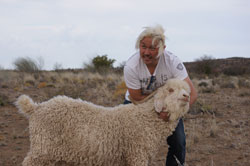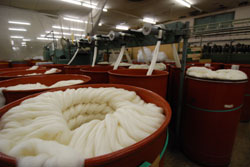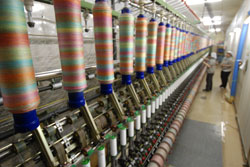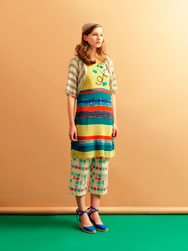Knit Apparel Sato Seni Co., Ltd.
Website: Sato Seni Co., Ltd.
M. & KYOKO
Category: Japanese Apparel & Textiles
In the beginning, was the worm

Creative director and President Masaki Sato, with an Angora goat
One hundred years ago, in Japan’s mountainous Yamagata Prefecture, the mostly farming population needed ways to sustain themselves during the long, snowed-in winters. Some, like the Sato family, kept silkworms among the rafters of their homes. In 1932, they broadened their activities by raising sheep for wool, and Sato Seni Co., Ltd. was founded by Chonosuke Sato, the current president’s great-grandfather. The company has been spinning yarn ever since.
Building on tradition

Cleaned and treated wool is prepped for further processing
Each of Sato Seni’s four generations of leaders has added its own contribution, and Masaki Sato is no different. He found himself facing an onslaught of cheap yarn and clothing from overseas, which put many Yamagata spinneries out of business. But Sato put his own stamp on the business by diversifying into high fashion, and making Sato Seni a byword for exquisite yarn.
Finer, softer, more luxurious

Sato Seni’s trademark colorful yarn waits to be turned into knitwear
Though he might not keep sheep anymore, Sato works hard to produce the finest wool and fibers, traveling far and wide to meet with shepherds, goatherds and alpaca farmers as well as their charges. From Australia to South Africa to Peru, Sato cultivates relationships with farmers, encouraging them to improve their product through care and breeding. Mohair, known for its coarse, scratchy texture, is transformed at Sato Seni. Coming from South African angora goats, Sato Seni has developed a thinner, silkier mohair yarn than ever before-a soft, supple yarn measuring 23.5 microns. This yarn feels luxurious and plush to the touch.
The high quality of the yarn comes from the conjunction of excellent source material and factory technology. In the spinnery industry, most companies use the latest machinery. But that means the end products can hardly be distinguished from one another. Sato uses his own specially adapted machines to ensure his product stands out. And top fashion comanies agree, with Sato Seni’s yarn being used by leaders.
Making their own mark

Sato’s colorful and unique clothing designs are cute and fun
Not satisfied supplying gorgeous yarn to others, Sato and his wife Kyoko wanted to make their own ideas come to life. They started the label M. & KYOKO, featuring original women’s designs made in Sato Seni’s factory with its own yarn. The brand blossomed and others followed, including menswear brand Masaki Kyoko Homme and a more casual, daily collection under the name noeud. These labels are sold at the company’s own boutiques all over Japan and in its showrooms in Tokyo, Osaka and New York.
From keeping silkworms under a snowy roof to creating beautiful garments from sheep to shelf, Sato Seni has woven the fabric of a truly rich history.
Website: Sato Seni Co., Ltd.
M. & KYOKO
(Courtesy: JETRO)
JETRO, or the Japan External Trade Organization, is a government-related organization that works to promote mutual trade and investment between Japan and the rest of the world. Originally established in 1958 to promote Japanese exports abroad, JETRO’s core focus in the 21st century has shifted toward promoting foreign direct investment into Japan and helping small to medium size Japanese firms maximize their global export potential.